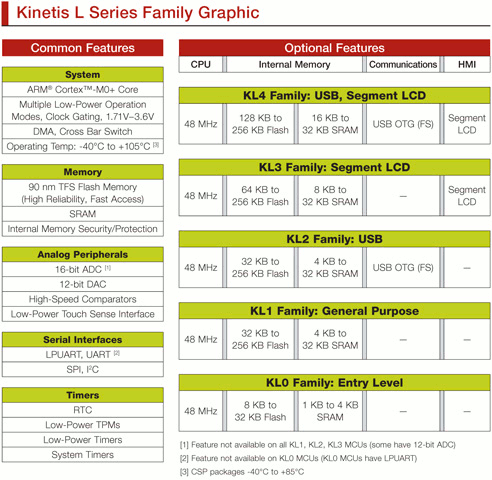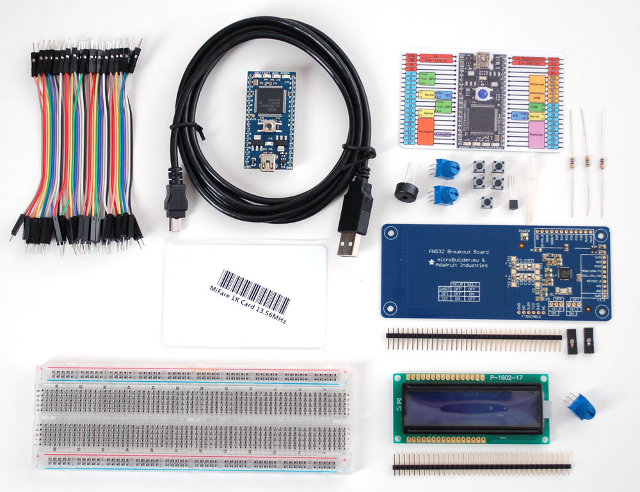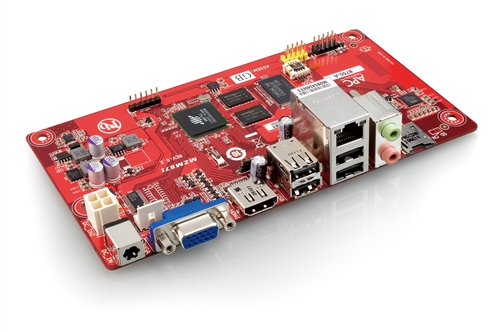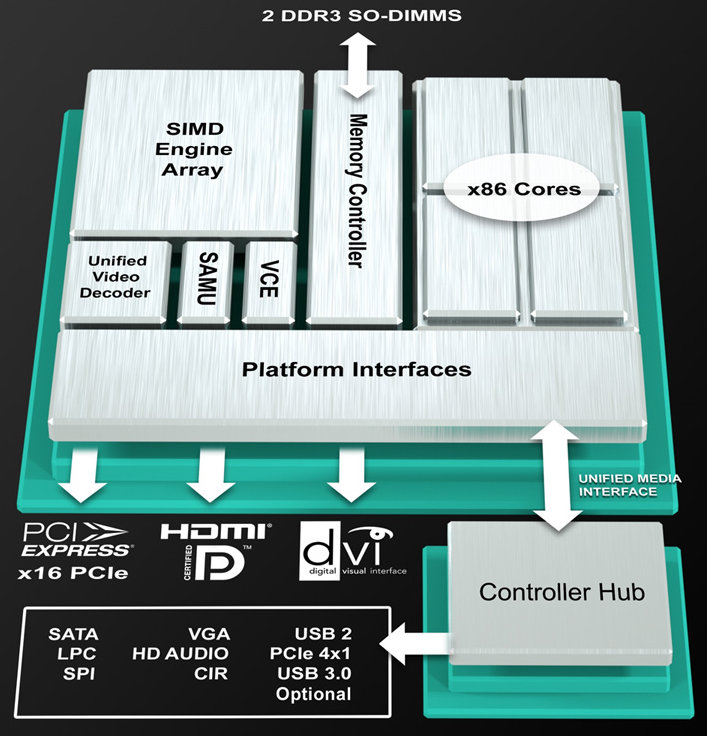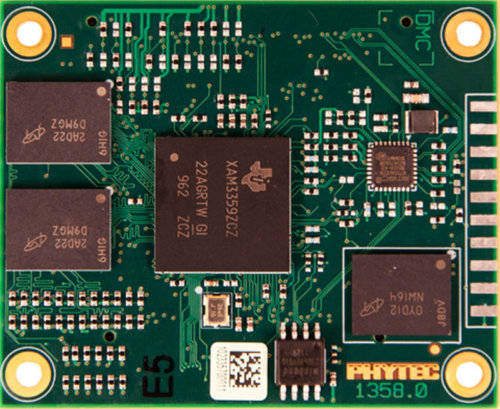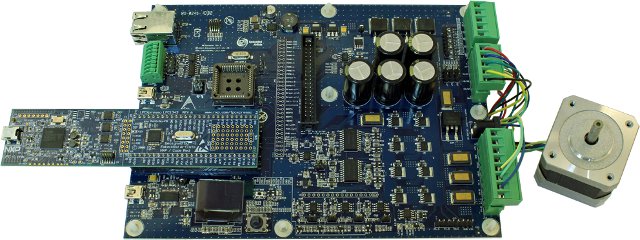ARM unveiled its ultra-low power Cortex-M0+ core back in March, and Freescale and NXP also announced their plans to use this new core in some of their micro-controllers destined to power the internet of things. Yesterday at Freescale Technology Forum (FTF), Freescale announced the availability of alpha samples of its Kinetis L series. This new low power MCU family will allow existing 8-bit and 16-bit architecture to be replaced by 32-bit architecture without increasing power consumption, cost or size, and the company expects them to be used in devices such as small appliances, gaming accessories, portable medical systems, audio systems, smart meters, lighting and power control. The ARM Cortex-M0+ processor is said to consume about a third of the energy of any 8- or 16-bit processor, while delivering between two to 40 times more performance. Kinetis L series MCU can consume as low as 50 uA/MHz in very-low-power run (VLPR) […]
Adafruit mbed and NFC/RFID Starter Pack with µNFC stack & NFC Mood Lamp Demo
If you are looking for a (relatively) low cost NFC development kit, you may interested in Adafruit mbed and NFC/RFID Starter Pack that sells for 134.99 USD. The kit contains the following items: mbed LPC1768 (Cortex M3) development board with mini-B USB cable and reference cards NFC/RFID breakout board based on PN532 NFC transceiver MiFare RFID card with 1K programmable EEPROM Full-sized breadboard 40 x 3″ (75mm) long male/male jumper wires Standard blue & white 16×2 character LCD + contrast potentiometer + header Diffused 5mm RGB LED + 3 x 560 ohm resistors Analog temperature sensor (TMP36) Piezo buzzer 2 x 10K trim potentiometer 5 x Tactile Pushbuttons On the software side, you can use AppNearMe µNFC stack written in C++ that allows you to use a user interface on NFC-enabled smartphone, removing the need for knobs, buttons, screens on your embedded device. During the initial pairing, the NFC board can […]
Zedboard Xilinx Zynq-7000 Community Board is Now Available
Based in March, I wrote about Xilinx Zynq-7000 Extensible Processing Platform (EPP), a SoC comprises of a Dual Cortex A9 and an FPGA, as well as the corresponding development boards and kits: Xilinx Zynq-7000 EPP ZC702 Evaluation Kit based on Zynq-7020 with all the basic components (595 USD). Xilinx Zynq-7000 EPP Video Kit based on Zynq-7020 with all necessary hardware, software and IP components for the development of custom video applications (1195 USD). Zynq-7000 EPP ZedBoard, a low cost development board for the developers community. At the time, the first 2 (expensive) boards were available, but there was little information about the Zedboard. But yesterday evening, I noticed Zedboard website had a lot more information and we now know details about the board and it is even possible to purchase it. Here are the Zedboard specifications: Processor – Xilinx Zynq-7020 Dual ARM Cortex-A9 MPCore @ 677 MHz Memory 512 MB […]
VIA Technologies Unveils the APC, an ARM11 $49 Android PC
VIA Technologies has today introduced the Android PC system (APC) powered by WonderMedia ARM11 processor, with 512 MB RAM and 2MB Flash in a small Neo-ITX motherboard and that will sell for a mere 49 USD, slightly higher than the 35 USD Raspberry Pi. But whereas the Raspberry Pi would struggle to run Android with 256 MB, the APC has just enough memory top run Android 2.3 and Android 4.0. Another advantage is the presence of a VGA connector which is missing on the Raspberry Pi, as well as a few other connectors. Here are VIA APC hardware specifications: VIA WonderMedia 8750 ARM11 CPU@ 800 MHz 2GB NAND Flash 512 DDR3 SDRAM Hardware Video Decoder supporting up to 1080p resolution VGA and HDMI display ports 4x USB 2.0 ports microSD slot 10/100 Ethernet port Audio-out/ Mic-in 15W power adapter Power consumption: 4 Watts (Idle) 13.5 Watts (Max. load) Dimensions: 17cm […]
AMD Launches AMD Embedded R-Series APU Platform
AMD has launched their AMD Embedded R-Series accelerated processing unit (APU) platform designed for mid- to high-end graphics-intensive applications such as digital signage, casino gaming, point-of-sale systems and kiosks, as well as parallel processing applications such as medical imaging and security/surveillance thanks to OpenCL and DirectCompute support. The AMD Embedded R-Series APU combines the “Piledriver” CPU architecture with an AMD Radeon 7000 Series GPU. There are 8 AMD R-Series APUs, 4 in PGA package and 4 in BGA package: R-464L – Quad Core APU @ 2.3/3.2 GHz with Radeon HD 7660G. TDP: 35W (PGA) R-460H – Quad Core APU @ 1.9/2.8 GHz with Radeon HD 7640G. TDP: 35W (PGA) R-272F – Dual Core APU @ 2.7/3.2 GHz with Radeon HD 7520G. TDP: 35W (PGA) R-268D – Dual Core APU @ 3.0/2.5 GHz with Radeon HD 7420G. TDP: 35W (PGA) R-460L – Quad Core APU @ 2.0/2.8 GHz with Radeon HD 7620G. […]
Phytec phyCORE-AM335x System on Module (SOM) Based on TI Sitara AM335x
PHYTEC announced the phyCORE-AM335x System on Module (SOM) powered by Texas Instruments Sitara AM335x Cortex-A8 processor clocked at 720Mhz and PowerVR SGX530 GPU. This SoM targets industrial applications and supports standards such as EtherCAT, Ethernet/IP, PROFINET, PROFIBUS, POWERLINK, SERCOS-III and CANopen. Here are phyCORE-AM335x SOM specifications: TI’s Sitara AM335x ARM Cortex-A8 processors @ 720 MHz (AM3352, AM3354, AM3356, AM3357, AM3358 and AM3359) PowerVR SGX530 Graphics (AM3359, AM3358, AM3354 only) 512 MB DDR3, 512MB/1GB NAND, 8 MB SPI Flash, 32 KB EEPROM 6x UARTs, 3x I2C, 2x McASP, 2x SPI, 2x CAN 2x USB OTG 2x 10/100/1G Ethernet (Gigabit PHY on carrier board) 24 bpp TTL or LVDS 44 x 50 mm form factor -40 degrees to +85 degrees C temperature range Linux, Compact 7, Android The phyCORE-AM335x SOM will be available in a PHYTEC Rapid Development Kit (RDK) including: phyCore-AM335x SOM A carrier board Board support packages (BSP) Demo images […]
Embedded Artists NXP LPCXpresso Motor Control Kit Promotion
Embedded Artist and NXP have jointly designed the LPCXpresso Motor Control Kit to easily get started with motor control prototyping. This platform is based on NXP LPCXpresso MCUs and can control BLDC (Brushless DC), BLAC (Brushless AC), stepper and dual brushed DC motors. This is not a new design (2010), but Embedded Artist and NXP are discounting their development kit by 50% for a limited period, which brings the price of the kit to 149 Euros, instead of 299 Euros. The kit includes: LPCXpresso Motor Control Board LPCXpresso LPC1114 Board (The “stick” on the left in the picture above) LPCXpresso Eclipse-based IDE and GNU compiler BLDC Motor with hall sensors 24V Power supply (60W) Here are the specifications of the Motor Control Board: Controller MCU • Socket for LPCXpresso LPC1114 and LPC1343 • Socket for LPCXpresso LPC176x • Socket for LPC1xxx in PLCC44 • Expansion connector for control by LPC1800/LPC4000/LPC2900 […]
Olimex A13-OLinuXino Could Become a Proper Raspberry Pi Alternative
Olimex recently announced they produced the first 10 prototypes of iMX233-OLinuXino Development Board, a low-end Linux development board that will cost 30 Euros, with specifications inferior to the Raspberry Pi. They have now announced their plan to design A13-OLinuxXino development board based on the new AllWinner A13 chipset, a strip down version of AllWinner A10 without HDMI nor SATA. Thanks to the low cost of AllWinner A13 (5 USD for very large orders / 10 USD in smaller quantities), Olimex plans to sell the new A13-OLinuxXino board for the same price as the iMX233-OLinuXino but with a faster 1GHz Cortex A8 processor and 256 or 512 MB RAM. I assume their will be 2 versions as well, the MINI for 29,95 Euros and the MAXI version with 2 more USB 2.0 host ports and 10/100Mbit Ethernet for 44.95 Euros. This board could be a very interesting alternative to the Raspberry […]


